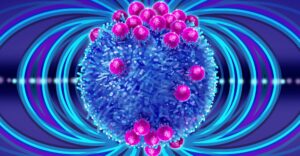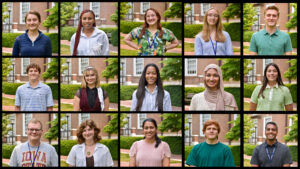Probing and Attacking the Cancer Surfacome with Jim Wells, PhD
The cell surface proteome(surfaceome)is a major hub for cellular communication and a primary source of drug targets, especially for biologics. My lab is interested in developing proteomic means to probe how the surfaceome changes in health and disease, especially cancer. Such changes involve alteration in protein expression and post-translational modifications such as proteolysis. I’ll describe new engineered tools we have built to probe the surfaceome changes that occur when oncogenes are expressed in isogenic cell lines to identify targets of interest. We then target proteins either upregulated, proteolyzed or both with recombinant antibodies derived by phage display to be used as validation tools and potential therapeutic leads
Jim received his BA from University of California at Berkeley, PhD from Washington State University (with Ralph Yount), and post-doc at Stanford (with George Stark), prior to joining Genentech, then Sunesis Pharmaceuticals, and finally UCSF. Wells’ group pioneered the engineering of proteins, antibodies, and small molecules that target catalytic, allosteric, and protein-protein interaction sites; and technologies including protein phage display, alanine-scanning, engineered proteases, bioconjugations, N-terminomics, disulfide “tethering”, and more recently an industrialized recombinant antibody production pipeline for the proteome. His team was integral to several protein products including Somavert for acromegaly, Avastin for cancer, Lifitegrast for dry eye disease, and engineered proteases sold by Pfizer, Genentech, Shire and Genencor, respectively. He is an elected member of the US National Academy of Science, American Association of Arts and Science, and the National Academy of Inventors.
This is a virtual event on Zoom. Click here to get the link.

The Advances in Immunoengineering: Fundamentals and Cutting Edge Advances workshop is hosted by Johns Hopkins Translational Immunoengineering. The workshop meets twice a week for three weeks and participants are eligible for CME credit. The workshop is also offered as a two-credit course to Johns Hopkins students
The immunoengineering field is transforming cancer, autoimmunity, regeneration, and transplantation treatments by combining the diverse and complex fields of engineering and immunology. There is a significant need to train engineers in immunology and immunologists in quantitative engineering techniques. Moreover, there is a need to bridge basic immunological discoveries with advances in clinical application. This workshop will review immune system fundamentals and components, engineering strategies to modulate the immune system, and clinical applications.
After attending this workshop, the learner will demonstrate the ability to:
– Review the fundamentals and recent discoveries in the function of the immune system.
– Identify engineering strategies to manipulate the immune system.
– Describe the clinical applications of immunoengineering.
The full schedule, speakers, topics, and registration information are available on JH-TIE’s website.
Engineers Week is a national, annual celebration of the vital contributions that engineers make to our world. The schedule of events can be found on their website.

SCOPE:
Translational research aims to move discoveries from the laboratory to the real world, maximizing the societal benefit of knowledge creation. This seminar seeks to help participants understand the paths to transfer academic technologies to the marketplace, enabling Johns Hopkins expertise to solve real world challenges.
LEARNING OBJECTIVES:
Upon completing the seminar, participants will be able to:
1. Explain the unique opportunities of the current climate for academic venture creation
2. Understand academic resources to help academic entrepreneurs
3. Define and apply three key principles of biomedical value creation
ABOUT THE SPEAKER:
Sashank Reddy completed his undergraduate studies at Johns Hopkins as a Beneficial Hodson Scholar, followed by MD/PhD studies at Harvard Medical School and MIT under the auspices of the NIH Medical Scientist Training Program. Following his clinical training at the Johns Hopkins University School of Medicine, Dr. Reddy joined the faculty in 2019. His NIH-funded laboratory studies developmental biology and regenerative medicine with a particular focus on soft tissues. Dr. Reddy is also an accomplished biomedical innovator and a founder of venture-backed companies. In his role at INBT, Dr. Reddy works to grow the scientific and translational excellence of the Institute.
Zoom Information: wse.zoom.us/j/96121697380
Abstract: Effective delivery of drugs is a major problem in today’s therapeutics. At a fundamental level, the challenge of drug delivery reflects the fact that the drug distribution in the body is limited by body’s natural metabolic processes and transport barriers. These biological barriers, while serving an important purpose of regulating body’s metabolic functions, limit the drug dose that ultimately reaches the target site. Accordingly, many drugs fail to reach their full therapeutic potential. Our research aims to understand body’s key biological barriers and develop novel means to negotiate these barriers to deliver drugs. We have developed means to use body’s own circulatory cells including red blood cells, macrophages, monocytes, neutrophils, NK cells and T cells to overcome body’s barriers and deliver drugs to target tissues for the treatment of cancer, autoimmune disorders and trauma. I will present an overview of these strategies and their efficacy in drug delivery.
Samir Mitragotri is the Hiller Professor of Bioengineering and Wyss Professor of Biologically Inspired Engineering at Harvard University. His research is focused on drug delivery systems. He is an elected member of the National Academy of Engineering, National Academy of Medicine and National Academy of Inventors. He is also an elected fellow of AAAS, CRS, BMES, AIMBE, and AAPS. He is an author of over 400 publications, an inventor on over 225 patent/patent applications, and a Clarivate Highly Cited Researcher. He received his BS in Chemical Engineering from the Institute of Chemical Technology, India and a PhD in Chemical Engineering from the Massachusetts Institute of Technology.
All are welcome to attend our 16th Nano-Bio Symposium on Cell Programming.
From Robert Hooke’s hazy observations to today’s single cell sequences and super-resolution images, cells have been a central focus of biological investigation. In 2023, the INBT’s Nano-Bio Symposium will explore breakthroughs in our ability to understand and program cells. Pioneering speakers will catalog the growing diversity of cell fate and cell state in multicellular organisms. Attendees will learn about powerful approaches to engineer cells using genetic, transcriptomic, and metabolic tools. And we will see how these methods are being translated into the clinic, ushering in a new era of powerful cellular therapies. By bringing together engineers, cell biologists, and translational scientists, the symposium will map the frontiers of this fundamental unit of biological organization.
This is event will feature lectures and a poster competition with a reception. Registration will be required.
More information coming soon.

Ultra-low temperature freezers consume as much electricity annually as a typical single-family home. Hopkins laboratories can lower their lab’s carbon footprint and challenge your cold storage practices by taking part in the Freezer Challenge. Supported by the International Institute for Sustainable Laboratories (I2SL) and My Green Lab, this challenge is designed to promote best practices in cold storage management for laboratories around the world.
Johns Hopkins operates over 1,500 Ultra-low temperature freezers and even more refrigerators, standard freezers, and cold rooms that utilize millions of kWh per year. The annual challenge encourages labs to implement best practices related to cold storage maintenance, from temperature tuning (-70C is the new -80C) to removing ice buildup, that all contribute to making freezer more energy efficient.
This year, top performing labs at each Johns Hopkins school have the opportunity to earn up to $5,000 in awards used for sustainable purchases, repairs, or upgrades. All labs with cold-storage units are eligible to join the challenge.
The challenge runs through July 1, 2023 but actions as far back as August 1, 2022 are eligible be included. Many of these practices you may already be doing! As an added bonus, participation in the Freezer Challenge earns labs 2 Sustainability Actions Points towards Green Lab Certification.
To learn more about our other Green Labs initiatives at Johns Hopkins, please visit the Office of Sustainability website or email sustainability@jhu.edu. You can learn more from Freezer Challenge Asks Labs to Put Costly Energy Consumption on Ice.
The Whiting School’s annual Engineering Design Day showcases our students’ creativity, problem-solving skills, and desire to make their mark on the world as they translate knowledge gained in classrooms and labs into innovations that solve real-world problems.
Enjoy more than 200 student presentations, posters, and demos representing every academic department at the Whiting School, and speak with students about their work.
A draft schedule will be provided soon. For more information, visit the Design Day website, where you also can see examples of last year’s projects. Registration is now open and required.

Johns Hopkins Career, Academic, and Research Experiences for Students (CARES) Symposium has a mission to inspire and provide opportunities to underrepresented students in science, public health, or medicine. It provides opportunities for students who participated in summer pathway or research program to share their summer research presentations to the Hopkins community, faculty, recruits from local colleges and universities, and network with high-achieving undergraduates. This year, the 2023 CARES Symposium is a two-day event.
We welcome you to come to the event and see presentations by our Nanotechnology for Biology and Bioengineering Research Experience for Undergraduates (REU) program interns. Learn more about our REU program.
Day One
1:00 pm: Welcome
1:05 pm: Keynote Speaker
1:25pm: Keynote Q&A
1:30 pm: Stories of Triump
1:45 pm: Breakout Rooms: Research Presentations
2:45 pm: Scholarship Awards
2:55 pm: Closing

Johns Hopkins Career, Academic, and Research Experiences for Students (CARES) Symposium has a mission to inspire and provide opportunities to underrepresented students in science, public health, or medicine. It provides opportunities for students who participated in summer pathway or research program to share their summer research presentations to the Hopkins community, faculty, recruits from local colleges and universities, and network with high-achieving undergraduates. This year, the 2023 CARES Symposium is a two-day event.
We welcome you to come to the event and see presentations by our Nanotechnology for Biology and Bioengineering Research Experience for Undergraduates (REU) program interns. Learn more about our REU program.
Register for the event here.
Day Two
9:00 am: Sign-In
9:30 am: Poster Session: Group A
10:30 am: Leadership Acknowledgment
10:40 am: Panel Discussion and Q&A
11:10 am: Stories of Triumph
11:25 am: Scholarship Awards
11:45 am: Leadership Acknowledgement
11:50 am: Transition
12:10 pm: Lunch
12:45 pm: Poster Session: Group B
1:45 pm: Adjournment


